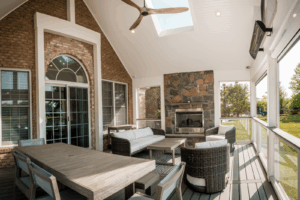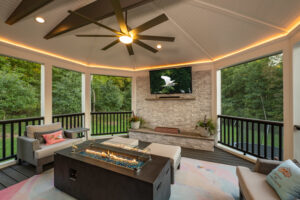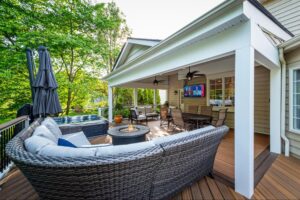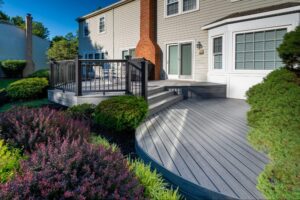When planning to build a deck for your home, several factors need careful consideration, such as the type of wood, the deck’s location, and the construction team. However, one crucial technical aspect that the team here at Deck Guru has noticed is often overlooked is the type of deck footing to install. The right deck footing is vital for ensuring the stability and longevity of your deck.
There are various types of deck footings available, each suited to different uses. Your choice will depend on whether your deck will be attached to your house or standalone, local building codes, and the deck’s size and height.
What Is a Deck Footing?
Deck footing, not to be confused with deck steps, serves as the foundation of your deck, connecting it securely to the ground. Only very small, ground-level decks can forego footings. For larger decks supporting more weight, proper footings are essential for safety and stability.
Why Are Deck Footings Important?
Deck footings prevent your deck from tipping or caving in and keep it elevated and dry, avoiding rot. They are also required by building codes in many areas, including Northern Virginia, ensuring your deck complies with legal regulations and remains safe for use.
Different Types of Deck Footings
Precast Cement Blocks
Overview: Precast cement blocks, or deck blocks, are popular due to their affordability and ease of installation. They are ideal for low-to-the-ground, freestanding decks.
Pros:
- Budget-friendly
- Simple installation
Cons:
- May not meet all building codes
- Less durable in high-wind areas
- Potential instability on uneven ground
Poured Concrete Footings
Overview: Poured concrete footings are robust and suitable for larger or elevated decks. They involve digging a hole and pouring concrete to create a strong support pillar.
Installation Process:
- Digging the hole below the frost line
- Pouring concrete directly or using a form
- Attaching deck posts with metal brackets
Pros:
- Highly durable and stable
- Customizable to any size or shape
- Suitable for various climates and soil conditions
Cons:
- Labor-intensive and time-consuming
- Higher cost
- Requires professional installation
Precast Cement Footings
Overview: These footings come in types such as stackable cement footings and concrete piers, offering durability and ease of installation without on-site concrete mixing.
Pros:
- Permanent and quick to install
- Available in various shapes and sizes
Cons:
- Higher material cost
- Difficult to transport and repair
Buried Post Footings
Overview: Buried post footings involve securing posts in the ground with concrete, providing a stable base for low-profile decks.
Installation Process:
- Digging a hole below the frost line
- Pouring concrete and securing posts
Pros:
- Cost-effective and less labor-intensive
- Stable and versatile
Cons:
- Concrete requires a curing time
- Less durable than other types
- Challenging to repair if damaged
Screw/Helical Piles
Overview: Screw or helical piles are modern, steel-manufactured footings driven into the ground using hydraulic machinery, suitable for various terrains.
Installation Process:
- Driving the piles into the ground with a hydraulic screwdriver
- Professional installation required
Pros:
- Extremely durable
- Quick installation
- Minimal soil disturbance
- Ideal for challenging terrains
Cons:
- Higher cost
- Requires professional installation
- Difficult to repair
Key Considerations for Deck Footings in Northern Virginia
Budget and Project Timeline
- Balance affordability and durability
- Choose footings that fit your project timeline to avoid delays
Local Building Codes
- Ensure compliance with Northern Virginia building codes
- Consider local weather conditions that may affect footing requirements
Freestanding Decks vs. Attached Decks
- Attached decks need less robust footings
- Freestanding decks require stronger, self-supporting footings
The Shape and Size of Your Deck
- Larger decks need stronger footings
- Consider slope and terrain for footing stability
Local Weather and Soil Conditions
- Assess soil stability in Northern Virginia
- Choose footings suited to local weather and soil conditions
Ready to Start Your Deck Footing Installation?
Choosing the right deck footing is essential for a stable, durable deck. For expert advice and professional installation, contact Deck Guru today by calling 866-306-1184 or filling out our contact form.
Frequently Asked Questions
Deck Footing vs. Foundation
The foundation is the post that transfers the deck’s load to the ground, while the footing is the part in contact with the earth or concrete, providing stability.
Can I install deck footings myself?
Some deck footing types are easy to install yourself. For others that require installation equipment, It’s best to have a professional install deck footings to ensure stability and compliance with local regulations.
What’s the difference between a deck footing and a deck post?
Footings are the concrete parts that touch the ground, while posts are the wooden pieces attached to the footings, supporting the deck.
How Many Footings Do You Need for Your Deck?
The number of footings depends on the deck’s size, design, and load requirements. Generally, footings should be less than eight feet apart.
For more information and personalized assistance, reach out to Deck Guru, your trusted deck designers and contractors in Northern Virginia.





